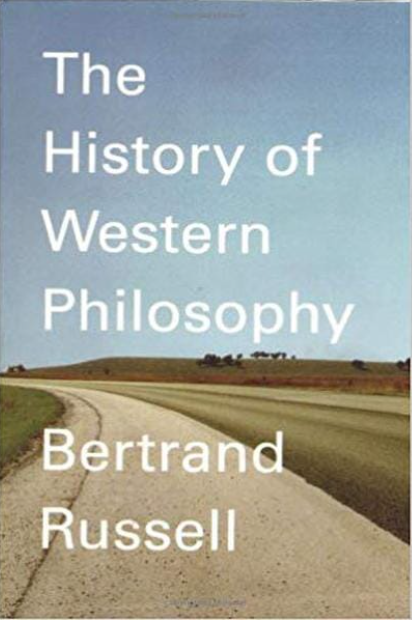Posted: December 12, 2021
The History of Western Philosophy

What do you think about when you hear the word ‘philosophy’? If you are like me the synonyms would be confusing, boring, useless, difficult, unimportant, unprofitable, and unnecessary. Given that, you might wonder why I’m reading something called "The History of Western Philosophy". I’m long past my school years and my work certainly doesn’t require it. Well, there is one synonym that I left out: fascinating.
Yes, I’ve read philosophy books in the past and I’ve struggled with them, unable to penetrate the concepts and I ended up setting them aside and reading easier books. The one exception is Boethius’s "Consolation of Philosophy", that medieval-age bestseller. I read it twice and understood a bit of it, enough to appreciate it, but I have to give it another read. Anyway, there is something about philosophy that kept calling to me. The next book I picked up was Plato’s "Republic". Read it once, was underwhelmed, but I feel that I gave it too much of a rapid read like it was a fiction novel. Philosophy books, it turns out, aren’t conducive to fast reading, they must be savored; it’s almost as if one has to converse with these books in one’s head in order to have a hope of understanding them.
This time, I decided to forgo reading a specific philosopher and decided to go with a well-regarded survey, this rather massive "The History of Western Philosophy". I found the historical parts easy to read but when the philosophies were being discussed this is where I struggled. I found some philosophies easy enough to understand like Epicurus, Marcus Aurelius, and Nietzche, I found others to be partly understandable such as Spinoza, Schopenhaur, St. Augustine, and Locke, Other philosophies just shut down my brain - I could not make head or tail of them. These would be the likes of Kant, Hegel, Plato, and Aristotle.
I actually bought some philosophy books because of this book. I bought a book about Epicurus and Marcus Aurelius’s "Meditations" because I am attracted to these philosophies. I also bought a one volume book on Aristotle featuring some famous works as well as a Plato volume with six of his dialogues. I bought these because these two philosophers, Plato and Aristotle, as can be read in "The History of Western Philosophy", are philosophical giants in terms of their influence on all other philosophers.
I may also pick up a book about Rousseau and maybe one about Byron because when I was reading about the Romantics I began to be aware that remnants of this philosophy such as nationalism and the emphasis on emotion is very much a part of my psyche - I find this slightly troubling.
So is this book worth reading? Is philosophy worth reading? I did not find this an easy read and many times I was entirely lost. Very early on, during the Greek philosophy part, I began to question why I was reading this book, particularly when the Greek philosophers were discussing metaphysical concepts that did not seem important to me. What kept me reading was the discussion on universals which talked about concepts that I’ve encountered before while studying computer programming. Hmm, it seems these discussions did have some kind of application.
As I continued to read I began to realize that philosophy is about the art of thinking; about how to think both deeply and well. I suppose what convinced me to continue to read philosophy is an incident that happened during a break in my reading.
I was watching a Netflix movie. It was one of those movies designed to bring out an emotional response, this one was meant to make the watcher angry and vengeful. Such movies have their attraction but they also bothered me a bit because I really don’t like to feel angry, especially not because of a movie.
This time around I was very surprised when I sensed my mind was resistant to the emotional pull of the movie - it was like I was somehow less gullible; like my mind was able to put up some kind of shield. At the same time, I found I was able to analyze aspects of the movie, both the characters in the story and the filmmaker's possible intent with each scene. I was able to better think about the movie and around the movie and it is an amazing capability that surprised and delighted me. I have a strong suspicion that this came about because of my philosophical readings.
My philosophy reading has somehow made my mind stronger and more agile, less susceptible to manipulation and more used to analysis. For this alone I definitely will continue reading philosophy.